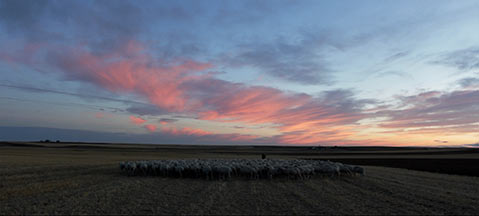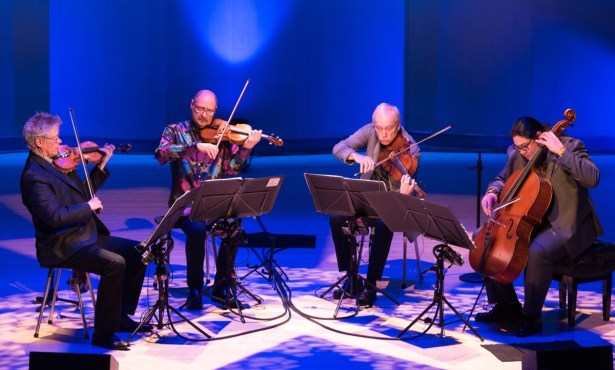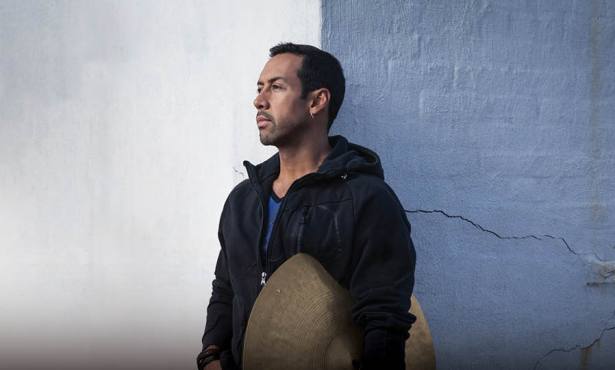The Shepherd
Director Jon Cenzual

The tension between those who’d prefer living traditionally on ancestral land and those who want to sell their lands to developers for fast cash steadily mounts in this expertly paced film about a Spanish shepherd. When he refuses to move, his neighbors’ need for money reaches a breaking point. See widemanagement.com/the-shepherd.
Is this film based at all on real events in Spain?
It’s more about the general situation in Spain where many people have been pushed out of their homes by ruthless banks and laws passed by people who have nothing to fear because they find themselves in a comfortable economic situation so they don’t really care if people are unable to survive economically. Even though the film doesn’t deal with that in particular, it was that sense of injustice that first got the idea rolling. It’s a social critique on greed and its corrosive power over people, so in that sense it’s universal. I just chose Spain because it was easier for me to shoot there.
The shepherd represents the good in people against the bullies and the greedy, but no one is entirely good. If pushed too far even the good can do some evil, so it’s also a warning.
Is there a lot of tension between development and people who want to stay in their old ways?
I don’t think so, as long as people let other people mind their own business. Development is not something that should be tied to a destruction of the old ways. At the same time, the old ways can benefit from development. Development should and has improved our lives and I am incredibly thankful for it. The problem is when people use that development as an excuse to get more power or riches while not taking anything else into consideration. That is abuse of power. This film is not a pro “’old ways” manifesto. It’s a warning to those who are willing to cross that ethical line in the pursue of economical gain.
The pacing of the film’s growing tension is excellent. How did you achieve that?
From the beginning, I knew that the pace was the most important factor in this film. So even before I wrote the script, I had a very clear idea of how the story’s arch should work. In that way, it doesn’t follow a typical film structure with ups and downs. I wanted it to start with a pace similar to a documentary and slowly build. I was very aware of it when directing the actors, making sure their emotions were kept in check throughout, especially with Anselmo, the shepherd, whose rage had to be very contained as to not blow up too early and kill the tension.
When it came to the edit it was quite easy as I shot it knowing how I wanted it to look in the end. I knew that the early scenes had to be longer and more pensive, with a slow increase of speed, but using the countryside shots and the shots of Anselmo by himself to keep the tempo’s momento in check.
Also the music plays a great part and I was very lucky to have my long time collaborator Tim Walters work on this as he did a great job.
Where was this shot?
It all shot in La Armuña, an area north of Salamanca. I chose that area for many reasons. I live there and I shot my first film there too so I know it very well and it made sense from a practical point of view. But the real reason I shoot there is because of it’s sparse and empty beauty. It doesn’t have beautiful forests or breathtaking mountains. There is nothing there, and that’s precisely what I love about it: the emptiness, the massive skies, the sense of insignificance you get there, and I knew that would work perfectly with the film. It mirrors a massive theatre stage where the action takes place but where there is nowhere to hide. It is a contradiction, but it becomes claustrophobic by it’s own shire size.
Are there many shepherds left in Spain? How is the country dealing with modernity?
There are less and less as younger people are not that interested in it anymore. It’s a very hard life and it’s not as supported as it should be, which is a real shame. Spain has been modern for years. After Franco died, Spain made sure to catch up and it got there a long time ago. In some aspects it has done an amazing job; for example, with renewable energies, it is one of the leading solar and wind power producing countries in the world. Every country has its modern side and its deeper, more traditional identity. The trick is not to loose the latter one in the pursuit of modernity.
Tell me about the film’s message of how the pursuit of money makes people act illogically.
I want people to be reminded that no one has the right to take something away from someone just because they think the can, or because they think they have the birth given right over someone else. This film could have been about a bully in a playground, or a country stealing the natural resources. At the end of the day, it is all bullying on different scales. If audiences think about this, then my work is done.



